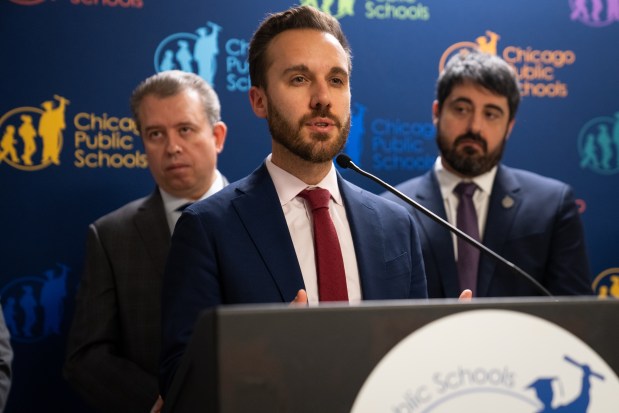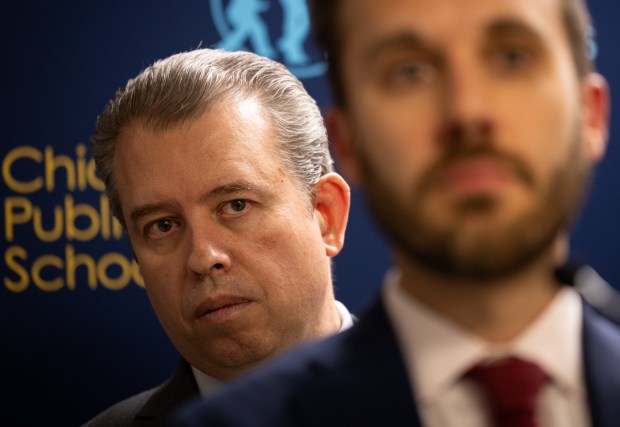After being unable to reach a deal on a teachers contract Tuesday, Chicago Public Schools and the Chicago Teachers Union met with a third-party law arbitrator Wednesday to commence fact-finding in an attempt to reach an agreement.
On Wednesday, both parties presented extensive briefs to the fact-finder.
The two groups have been bargaining since April, as the teachers’ contract expired in June. While some headway has been made and the sides have come to tentative agreements regarding some contract proposals, there are still several sticking points.
Martin Malin, the fact-finder, will review the reports submitted by CPS and CTU, and issue recommendations, which are non-binding. Both parties can accept or reject the recommendations. However, if one party rejects, Malin’s report will be made public and after 30 days, the union can issue a 10-day strike notice.
Since being established in state law in 2010, the fact-finding process has been used three times. In two cases, teachers ultimately went on strike.
During the briefings, the union is requesting the fact-finder consider several things, including that the union’s proposals are aligned with the district’s five-year strategic plan, the district is in a “better financial position today” compared to the last five contract negotiations and the union’s raise proposals are “fair, appropriate and (that) the district can afford them.”
Before Dec. 24, prior to CEO Pedro Martinez being granted a temporary restraining order following the school board’s vote to terminate him, CTU President Stacy Davis Gates said a “tremendous amount of bargaining” had been done. However, since then, the union has said negotiations have essentially come to a standstill.
“What this feels like is that the district is going on strike,” Davis Gates said. “That they are choosing to create a process that forces the hands of the members who teach our young people in our schools every day, which is very discouraging.”
District officials disagreed. At a news conference Thursday, Martinez said that their team has continued to show up to contract talks following a statement from the district that said they “will continue to meet our labor partners at the negotiations table and bargain in good faith.”
While CPS said in a statement that it “welcomes the fact-finding process as a means to clearly identify the issues to be addressed and resolved,” Davis Gates said Wednesday that this process “shifts what we talk about in bargaining only to finances, not what children need.”
Key proposals unresolved include raises and staffing proposals.
The district is offering a 4% salary increase for the first two years of the contract, then a 5% ceiling for the following two years. The union is seelomg 5% raises for the first two years.
Thad Goodchild, CTU’s deputy general counsel, said at a news conference Thursday this proposal is “completely financially achievable,” and will allow the district to retain career teachers, rather than lose them to districts in the suburbs where they’d be able to make more as their careers progress.
“(This) would more fairly compensate career educators and encourage career educators to stay in the school district (which) we think is vitally important for the district students,” Goodchild said.
Ben Felton, the district’s chief talent officer, said Thursday that CPS can not afford more than a 4% increase and that to offer more would be “irresponsible.”
Felton added that the union’s staffing proposals are also “simply unaffordable,” and that their bid to add thousands of staff members would be “jeopardizing the jobs of the existing staff members.”
The union has reiterated that the district is in a better financial position to settle this contract than in years past and that their proposals are “reasonable and realizable.”
“The district actually wants the fact-finder to only look at what’s in their bank account right now, which is like deciding if you can pay rent based on what’s in your pocketbook rather than in your next paycheck,” said Pavlyn Jankov, CTU’s research director.
This year, the district received a record $300 million in tax increment financing, and Jankov said based on the schedule of TIF district expirations, CPS will receive a total of $986 million by 2031, with annual increases of $50 million to $100 million.
This, along with CPS’ financial reserves being currently higher than at any point in the last two decades as well as the district’s “debt service (expecting) to reduce and its borrowing position to improve greatly in the coming years,” the union firmly believes that the district can afford their proposals.
Michael Sitkowski, the district’s chief budget officer, said the union continues to “push a false narrative” that the district has over a billion dollars in reserves which he says is not true.

While the district made a one-time decision in 2014 to borrow from next year’s budget to cover the current year’s cost, it was done to solve a budget crisis at the time and to coincide with the shift in the schedule of property tax disbursements coming in from the county. However, it was a temporary fix and the district is now dealing with the consequences.
Under Martinez, CPS has worked to minimize borrowing that would cost the district money that would be better used going into classrooms. Because of the 2014 decision, the district has had to continue “short-term borrowing for routine expenses.”
This has resulted in CPS appearing to have more money in reserves than they actually do. Sitkowski said that the district is “at the end of our rope” and they “need more revenue.”
“There’s been references to increasing our deficit to $1 billion since we’re already facing a $750 million deficit. Candidly, we are floored by this suggestion,” Sitkowski said. “This line of thinking is not only irresponsible, it is flat-out reckless.”
As the district and the union provide the fact-finder with their briefs Wednesday and Friday, Sitkowski said that the district is “confident that the fact-finder will verify the district’s precarious financial position” which will hopefully “convince the CTU to agree to a more realistic set of proposals and finally settle this contract.”
Union officials disagree.
“Fact-finding in itself will not get us to a conclusion, especially not our side,” Davis Gates said. “Fact-finding is set up for the employer to win. … This is just a process, a box that we have to check, in order to get to the next part of the process.”
Malin will likely issue his recommendations by mid-February, according to the district and the union.
imohamed@chicagotribune.com



